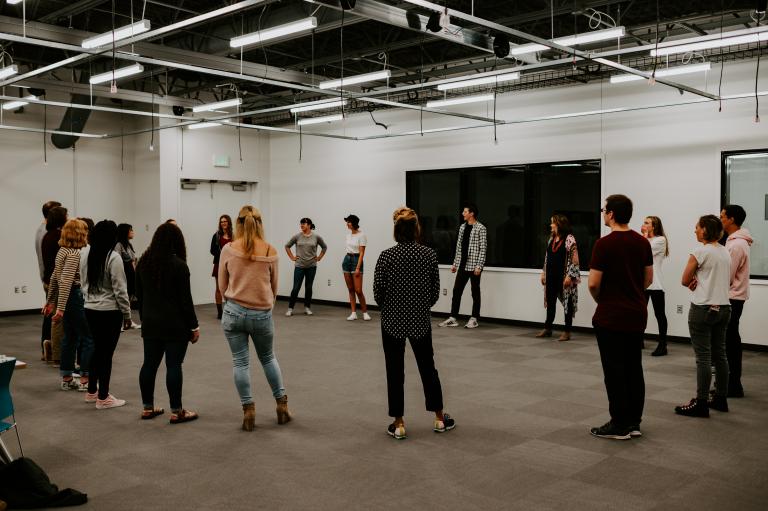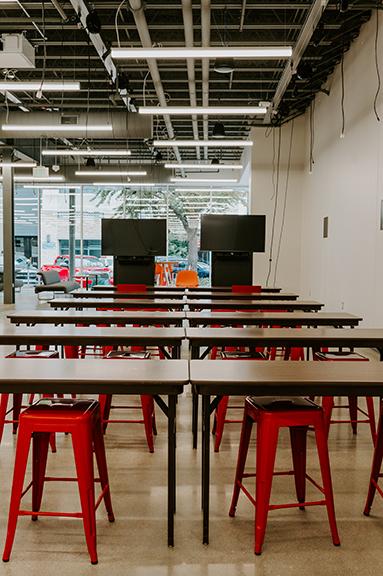
Nebraska's 'transformative' emerging media arts program opens
calendar icon26 Aug 2019

Lincoln, Neb.--The University of Nebraska–Lincoln will welcome the “wizards and pirates and magicians of the world” when it opens the doors on its new Johnny Carson Center for Emerging Media Arts on Aug. 26.
Preparations for the center were launched in 2015 with a $20 million gift from the foundation of iconic talk show host Johnny Carson, himself a magician who hailed from Nebraska. Director Megan Elliott said she envisions the new Carson Center will become the premier destination for “transformative creative leaders — the best and brightest students, faculty, visiting artists, entrepreneurs and scientists from around the world.”
Even before its official opening, the center earned a Hewlett Packard/Educause Campus of the Future designation, the first program in the Big Ten to do so. It’s a partnership with a Fortune 100, global corporation that will give Nebraska access to the latest high-tech equipment — and put Nebraska in the company of MIT, Harvard University’s Graduate School of Education, Yale University and Dartmouth College in investigating ways augmented reality, virtual reality and 3D scanning and printing technologies can benefit teaching, learning and research.
“It is so exciting to see the vision of this center become reality under the leadership of Megan Elliott, and it’s a tremendous honor to be the first university in the Big Ten to earn the HP/Educause designation,” Chancellor Ronnie Green said. “Through the Johnny Carson Center for Emerging Media Arts, Nebraska will equip coming generations of leaders with the imagination and skills to solve the ‘wicked problems’ of the future.”
“The Carson Center’s groundbreaking approach to teaching and collaboration will empower the next generation of creative pros to succeed using vital immersive technology while developing production skills,” said Gus Schmedlen, vice president, education, HP Inc. “HP is proud to enable the University of Nebraska to reinvent how their students and faculty explore and create using the ultimate in virtual reality gear, the HP VR Backpack and HP Reverb VR Headset.”
“I talk about recruiting the wizards and the pirates and the magicians of the world,” Elliott said. “They’re the kinds of people I’m interested in. You have to be brave and courageous to be truly imaginative.”
The center is part of the Johnny Carson School of Theatre and Film in the Hixson-Lied College of Fine and Performing Arts. The school’s film and new media curriculum has been incorporated into the new center. A key part of its new curriculum will prepare students for hugely disruptive forces in artificial intelligence and data streaming that have changed the face of several industries, including film.
But the center’s inaugural 33 students and those who come after will be prepared for thus-far unimagined careers that extend far beyond the entertainment industry, Elliott said.
“Media is an industry-building industry,” she said. “I see our students going into not just the entertainment industries, but the experience economy. They might design experiences for retail, for manufacturing, for health care, for museums. They may go into data visualization for the insurance industries. They may do virtual reality environment for architecture. I can see our students going into anything.”
Two new faculty members — one a speculative artist from The Design Lab at Hyundai and the other a virtual reality lecturer from Stanford University — will join Nebraska’s existing film school faculty.
Ash Smith, who creates stories for film, stage and immersive play, was associate director of the Art and Technology program at the University of California, San Diego, along with pursuing pioneering work as part of the Speculative Design Team at Hyundai on robotaxis and microbility at The Design Lab.
Jesse Fleming is an artist, filmmaker and researcher who creates immersive live and virtual experiences. He taught virtual reality, video, photography and design at the University of California, Los Angeles, from 2014-17, and virtual reality at Stanford in 2019. His work is in the collection of the Whitney Museum of Art and the Borusan Contemporary, Istanbul. In 2014, he was listed as one of the top artists in Los Angeles in Artforum Magazine’s annual best-of list.
Elliott said the new center will deliver a curriculum based on four cognitive skills needed to thrive in the age of intelligent machines: critical thinking, systems thinking, cultural agility and entrepreneurship.
Nebraska’s emerging media arts majors will become “X-shaped students.” While traditional higher education has delivered “I-shaped” students with deep knowledge in one area, and more colleges are beginning to focus on “T-shaped” students with a breadth of knowledge in addition to specialization in one area, the center plans to go further by creating the X-shaped student with mastery in four areas: design, storytelling, computational creativity and entrepreneurship.
Carson Center students will learn both improv theater and magic — to honor Carson, who put himself through college at Nebraska as a magician, and because of the nimbleness they gain from those skills.
“With improv, there’s three rules — you always have to start with ‘yes,’ you always have to make your partner look good, and you always have to serve the story, something greater than yourself,” Elliott said. “A magician is only as good as the story they tell. They know how to direct or misdirect the gaze. And they’re always looking for that ‘aha’ moment.”
Elliott said Nebraska, with ethos of tinkering and scrappy thinking, truly is a place where magic can happen.
“You don’t just walk blindly into the future, right?” she said. “We get to imagine the future we want to bring into being, and I think that is magical.”
Elliott is also excited to be sharing the building with the dance program from the Glenn Korff School of Music, which is moving into their new space in the Center from their former location in Mabel Lee Hall.
“Dance are great collaborators,” Elliott said. “A lot of the most interesting Virtual Reality (VR) and immersive experiences that I’ve seen at New Frontiers at Sundance Film Festival, for example, involved dance.”
Associate Professor Susan Ourada, who is the head of the dance program, is also eager to have space in the new Center.
“We are so excited to have these beautiful spaces,” she said. “With two studios, we will have programming and rehearsal capabilities we could only imagine before. Stay tuned! We have some pretty neat ideas percolating.”
Ourada is looking forward to better showcasing the work of students, faculty and guest artist work in the new space.
“One thing that I’m particularly eager to start will be work-in-progress showings of our student, faculty and guest artist work,” Ourada said. “We intend to be active on First Fridays with these types of informal events and have lots of other ideas for bringing the community to us. DanceUNL is coming to downtown Lincoln, and we can’t wait to be there.”
To see additional video with Elliott, visit https://go.unl.edu/oxhi.